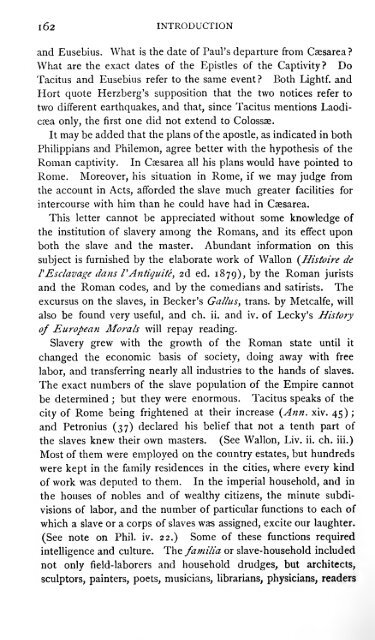Philippians and Philemon - MR Vincent - 1906.pdf
Philippians and Philemon - MR Vincent - 1906.pdf
Philippians and Philemon - MR Vincent - 1906.pdf
Create successful ePaper yourself
Turn your PDF publications into a flip-book with our unique Google optimized e-Paper software.
1 62<br />
INTRODUCTION<br />
<strong>and</strong> Eusebius. What is the date of Paul's departure from Caesarea?<br />
What are the exact dates of the Epistles of the Captivity? Do<br />
Tacitus <strong>and</strong> Eusebius refer to the same event ? Both Lightf. <strong>and</strong><br />
Hort quote Herzberg's supposition that the two notices refer to<br />
two different earthquakes, <strong>and</strong> that, since Tacitus mentions Laodi-<br />
csea only, the first one did not extend to Colossse.<br />
It may be added that the plans of the apostle, as indicated in both<br />
<strong>Philippians</strong> <strong>and</strong> <strong>Philemon</strong>, agree better with the hypothesis of the<br />
Roman captivity. In Caesarea all his plans would have pointed to<br />
Rome. Moreover, his situation in Rome, if we may judge from<br />
the account in Acts, afforded the slave much greater facilities for<br />
intercourse with him than he could have had in Caesarea.<br />
This letter cannot be appreciated without some knowledge of<br />
the institution of slavery among the Romans, <strong>and</strong> its effect upon<br />
both the slave <strong>and</strong> the master. Abundant information on this<br />
subject is furnished by the elaborate work of Wallon {Nistoire de<br />
rEsclavage dans PAntiqinte, 2d ed. 1879), by the Roman jurists<br />
<strong>and</strong> the Roman codes, <strong>and</strong> by the comedians <strong>and</strong> satirists. The<br />
excursus on the slaves, in Becker's Galliis, trans, by Metcalfe, will<br />
also be found very useful, <strong>and</strong> ch. ii. <strong>and</strong> iv. of Lecky's History<br />
of European Morals will repay reading.<br />
Slavery grew with the growth of the Roman state until it<br />
changed the economic basis of society, doing away with free<br />
labor, <strong>and</strong> transferring nearly all industries to the h<strong>and</strong>s of slaves.<br />
The exact numbers of the slave population of the Empire cannot<br />
be determined ; but they were enormous. Tacitus speaks of the<br />
city of Rome being frightened at their increase (Ann. xiv. 45);<br />
<strong>and</strong> Petronius (37) declared his behef that not a tenth part of<br />
the slaves knew their own masters. (See Wallon, Liv. ii. ch. iii.)<br />
Most of them were employed on the country estates, but hundreds<br />
were kept in the family residences in the cities, where every kind<br />
of work was deputed to them. In the imperial household, <strong>and</strong> in<br />
the houses of nobles <strong>and</strong> of wealthy citizens, the minute subdi-<br />
visions of labor, <strong>and</strong> the number of particular functions to each of<br />
which a slave or a corps of slaves was assigned, excite our laughter.<br />
(See note on Phil. iv. 22.) Some of these functions required<br />
intelligence <strong>and</strong> culture. The familia or slave-household included<br />
not only field-laborers <strong>and</strong> household drudges, but architects,<br />
sculptors, painters, poets, musicians, librarians, physicians, readers





